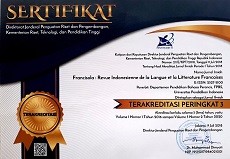THE PLACE OF CODE-SWITCHING AS A MEDIUM OF INSTRUCTION IN LANGUAGE CLASSROOM IN GHANA: A CASE STUDY
Abstract
RÉSUMÉ. Dans le cas des langues en contact, l’emploi d’alternance codique par des enseignants et des apprenants devient un objet de discussion dans des institutions scolaires. L’objectif de ce travail est d’examiner le phénomène d’alternance codique en classe de français langue étrangère pour évaluer son influence sur l’enseignement/apprentissage du français langue étrangère dans le contexte ghanéen. Les données sont recueillis à travers l’observation des cours de français et les résultats sont analysés et représentés graphiquement. Les résultats ont montrés que l’alternance de code en classe de français langue étrangère promeut la communication et facilite l’interaction entre les enseignants et les apprenants. L’attention est prêtée au cas où le français est introduit pour la première fois en classe afin de faire ressortir des problèmes que font face les apprenants. L’alternance codique est donc important pour l’enseignement/ apprentissage du français langue étrangère et doit être inclus dans des programmes d’études de français au Ghana.
Mots-clés : alternance de code, interaction, langue étrangère, phénomène sociolinguistique, situation bilingue.
ABSTRACT. In regard to languages coming into contact, the use of code-switching on the part of language facilitators and the learners has become an issue of discussion especially in the school setting. This paper sets out to examine critically the code switching phenomenon to ascertain its effects and necessity on the teaching and learning of French as a foreign language in Ghana. Data was collected through classroom observation while lectures were going on and the result was analyzed and represented in table form. The findings show that language switching in a classroom helps and supports the learning environment and makes it conducive for those involved. A careful consideration of code switching is done mostly at the level where the French language is introduced for the first time. The outcome of this paper suggests that code switching is important to the teaching and learning of French language and it must be adopted in our curriculum of studies.
Keywords: bilingual situation, code switching, foreign language, interaction, sociolinguistic phenomenon
Full Text:
PDFReferences
Appel, R. & Muysken, P. (1987). Language Contact and bilingualism. London: Edward Arnold.
Flyman-Mattsson, A., & Burenhult, N. (2009). Code-switching in second language teaching of French. Working Papers in Linguistics, 47, 59-72.
Romaine, S. (1992). Bilingualism. Cambridge: Blackwell Publishers.
Yevudey, E. (2013). The pedagogic relevance of codes witching in the classroom: insights from ewe-English codes witching in Ghana. Ghana Journal of Linguistics 2.2: 1-22 (2013).
Youkhana, S. (2010). Code-switching in the foreign language classroom. Höstterminen. Engelska, 15, 61-90.
DOI: https://doi.org/10.17509/francisola.v2i2.9408
Refbacks
- There are currently no refbacks.
Copyright (c) 2017 FRANCISOLA

This work is licensed under a Creative Commons Attribution-ShareAlike 4.0 International License.
View My Stats











